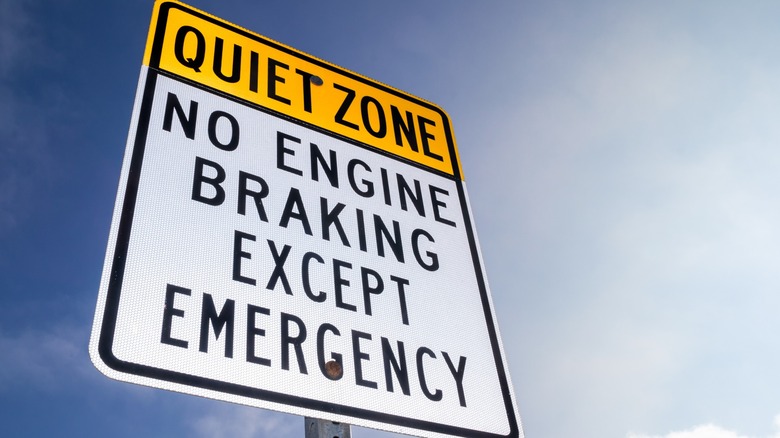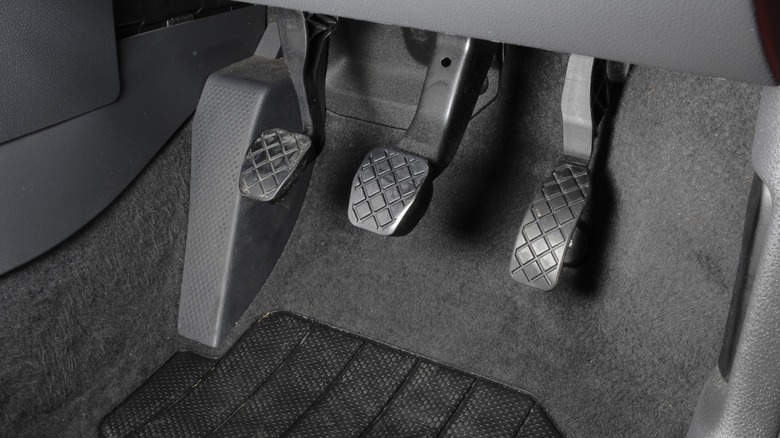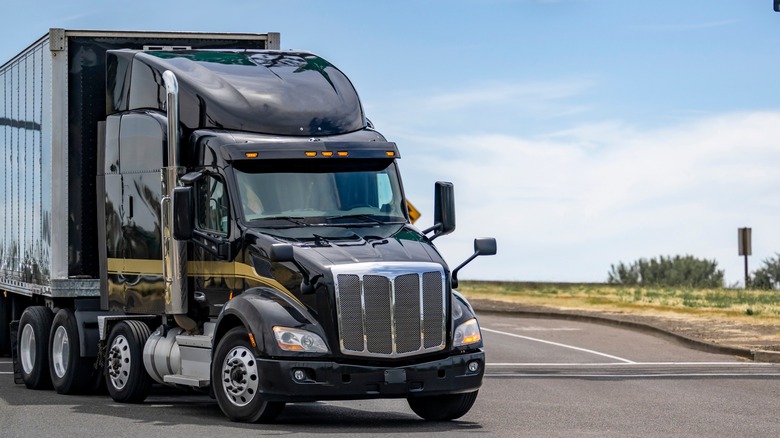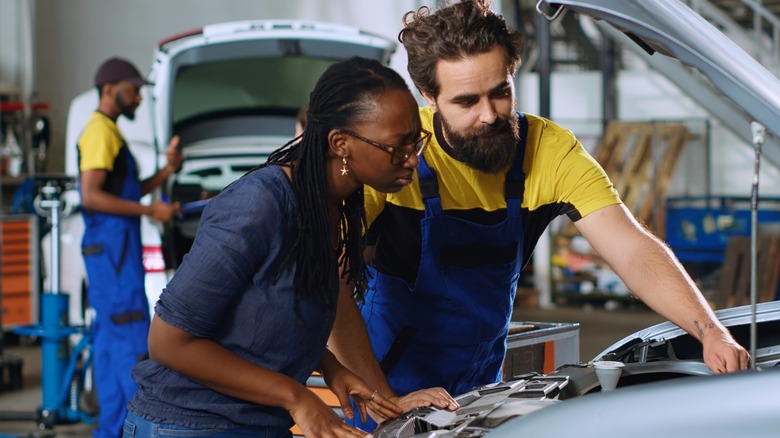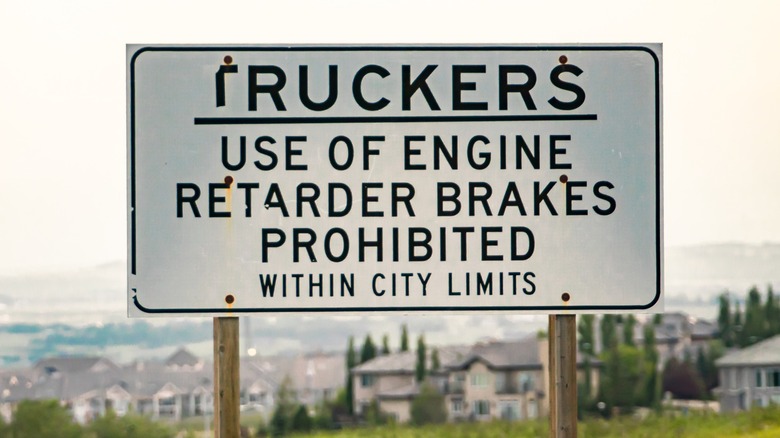What Is Engine Braking And Why Is It Prohibited In Some Areas?
Ideally, everyone would go through driving school before getting behind the wheel. That's where you learn about road signs, traffic laws, and safe driving techniques. But let's be honest— that's not always how it works out.
Maybe a parent, friend, or colleague showed you the basics, and you've been driving ever since. Then, one day, you're out driving and spot a sign that says "Engine Braking Prohibited," and you realize you have zero clue what that means or why it's even a big deal.
Interestingly, you might be surprised to learn that engine braking is something you've been doing all along without even realizing it. It's a way of bringing your car to a slow stop without actually hitting the brakes. So, while this might be something you've done instinctively or even regularly, it's important to know that in certain areas, it's actually against the law. Here's what you need to know.
What is engine braking?
If you've ever driven down a slope and found yourself easing off the accelerator while your car is still in gear, you've probably been engine braking without even realizing it. Here's how engine braking works.
When you lift your foot off the accelerator, the engine's throttle valve closes. This action cuts down the flow of air and fuel into the engine, creating resistance within the engine's cylinders. Instead of the engine propelling the car forward, it uses the car's momentum against itself to bring you to a slow stop.
Now that you understand what engine braking is, it's time to understand what it's not. Engine braking is not the same thing as coasting. Coasting is when you shift the car into neutral or disengage the clutch while driving. This way, the engine is no longer helping to manage your speed. Without the engine connected, there can be no engine braking effect, which means you'll have to rely solely on the foot brake to slow down or stop.
How is engine braking different from Jake braking and downshifting?
Engine braking, Jake braking, and downshifting are all quite related, but they're not exactly the same. Downshifting is a more active form of engine braking. It involves shifting the car into a lower gear to increase the engine RPMs, which creates additional resistance. However, with engine braking, you simply take your foot off the accelerator while the car's still in gear. However, when you manually shift to a lower gear, you force the engine to work harder, which slows the car down more quickly once you release the throttle.
Meanwhile, further along on the spectrum of engine braking is Jake braking, which is more common with heavy-duty vehicles. While engine braking is a somewhat natural process that occurs when you ease off the accelerator, Jake braking works by altering the timing of the engine's exhaust valves.
When you engage the Jake brake, the exhaust valves open at the top of the compression stroke, releasing compressed air from the engine's cylinders. This sudden release of air creates a powerful braking force that slows down the vehicle. Truck drivers love to use this technique to control their speed because it preserves their actual brakes, but it's annoying for everyone else because Jake braking can be notoriously loud.
Is engine braking safe?
Many drivers consciously use engine braking to save their brakes. By allowing the engine to take on some of the work of slowing down the car, they use the brakes less frequently and less forcefully. With less wear and tear on the brake pads and rotor, these parts last longer. Engine braking can also help reduce the possibility of a brake fade, a condition where the brakes become less responsive. Additionally, during engine braking, fuel-injected engines cut off the fuel supply, meaning that the engine isn't consuming fuel while it's helping to slow down the vehicle.
However, while engine braking can help you reduce brake wear and save some gas, there are some downsides. If you use this technique suddenly or aggressively, especially if you downshift too quickly, you can increase wear and tear on the clutch and gearbox. It may also take a toll on your car's drivetrain.
When you use engine braking, you're essentially redirecting the heat that the braking system would normally absorb into the engine. So, think about whether protecting your brakes, which are relatively inexpensive to replace, is worth placing additional stress on your engine, which can cost thousands of dollars to repair.
Another thing you should consider is safety, particularly when driving in traffic. When you use the actual braking system to slow down or stop, your brake lights come on, signaling to drivers behind you that you're decelerating.
However, when you rely on engine braking alone, your brake lights don't come on, which could catch other drivers off guard. Without that visual cue, your slowing down might come as a surprise, increasing the risk of a rear-end collision. So, you have to be mindful of when and how you use engine braking, especially in traffic or when driving close to other vehicles.
Is engine braking legal?
Engine braking can help you have a smoother driving experience. For the most part, if we're talking about regular passenger vehicles, it's mostly lawful. However, with Jake braking, a more specific form of engine braking used in heavy-duty vehicles, there are restrictions mostly because it is quite loud.
This noise, which can sound like a machine gun firing, can be disruptive, especially in residential or noise-sensitive areas. Because of this, many municipalities have enacted laws that restrict or ban the use of Jake brakes, primarily because of noise pollution. In some areas, you're allowed to use Jake brakes only if the vehicle is fitted with a proper muffler that masks the noise to a somewhat acceptable level.
Depending on the local laws, there are corresponding penalties for non-compliance. Montana, for instance, passed a bill in 2003 that requires all commercial vehicles equipped with engine brakes to have mufflers. If you violate this law, you may be charged with a misdemeanor and fined $500. So, if you're a truck driver or fleet operator, make sure to do your research and ensure your vehicles are compliant with local laws.
